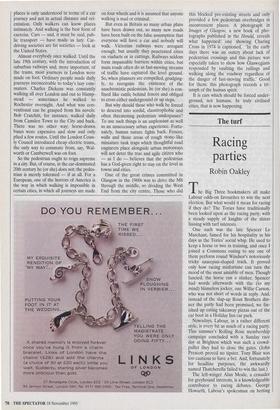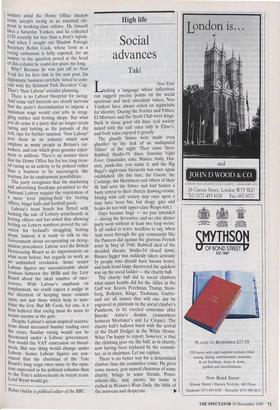The turf
Racing parties
Robin Oakley
The Big Three bookmakers all make Labour odds-on favourites to win the next election. But what would it mean for racing if they do? The Tories have traditionally been looked upon as the racing party, with a steady supply of knights of the shires liaising with turf interests.
One such was the late Spencer Le Marchant, famed for his hospitality in his days as the Tories' social whip. He used to keep a horse or two in training, and once I joined a Commons outing to see one of them perform round Windsor's notoriously tricky saucepan-shaped track. It proved only how racing misfortune can turn the mood of the most amiable of men. Though fancied, the horse ran a stinker. Spencer had words afterwards with the (to my mind) blameless jockey, one Willie Carson, who was not short of words in reply. And, instead of the slap-up Roux Brothers din- ner the party had been promised, we fin- ished up eating takeaway pizzas out of the ear boot in a Holiday Inn car park.
Nowadays, Labour, in a rather different style, is every bit as much of a racing party. This summer's Rolling Rose membership campaign concluded with a Sunday race day at Brighton which was such a crowd- puller they had to close the gates. (John Prescott proved no tipster. Tony Blair was too cautious to have a bet. And, fortunately for headline purposes, the awkwardly named Thatcherella failed to win the last.) The left-winger Alan Meale, a crusader for greyhound interests, is a knowledgeable contributor to racing debates. George Howarth, Labour's spokesman on betting matters amid the Home Office shadow team, accepts racing as an essential ele- ment in working-class culture. He himself likes a Saturday Yankee, and he collected £150 recently for less than a fiver's layout. And when I sought out Shadow Foreign Secretary Robin Cook, whose form as a racing enthusiast is fully exposed, for an answer to the question posed at the head of this column he could not spare me long.
Why? Because he was just off to New York for his first visit in the new post, his diplomatic business carefully timed to coin- cide with the Belmont Park Breeders' Cup. That's 'New Labour' socialist planning.
There is no Labour blueprint for racing. And some turf interests are clearly nervous that the party's determination to impose a minimum wage would cost jobs in strug- gling stables and betting shops. But what you do sense is a party that no longer treats racing and betting as the pursuits of the rich, ripe for further taxation. 'New Labour' sees them as an industry which now employs as many people as Britain's car- makers, and one which gives genuine enjoy- ment to millions. There's an instinct there that the Home Office has for too long treat- ed racing as an activity to be policed rather than a business to be encouraged, like tourism, for its employment possibilities.. The party recognises that the marketing and advertising freedoms permitted to the National Lottery require the restoration of a more level playing-field for betting offices, bingo halls and football pools. Labour's front bench has flirted with backing the sale of Lottery scratchcards in betting offices and has noted that allowing betting on Lottery numbers proved the sal- vation for Ireland's struggling betting shops. Indeed, it is ready to talk to the Government about co-operating on dereg- ulation procedures. Labour sees the British Horseracing Board as an improvement on what went before, but regards its work as an unfinished revolution. Some senior Labour figures are uncomfortable about tensions between the BHB and the Levy Board about the ideal number of race- courses. With Labour's emphasis on employment, we could expect a nudge in the direction of keeping more courses ?pen, not just those which help to max- imise the levy. But Mr Cook, for one, is a firm believer that racing must do more to secure income at the gate. Despite Labour's union-inspired reserva- tions about increased Sunday trading over the years, Sunday racing would not be threatened under a Labour government. Nor would the VAT concession on blood- stock. But one thing would change under Labour. Senior Labour figures are con- vinced that the chairman of the Tote Board's long reign owes more to the opin- ions expressed in his political columns than to the Tote's achievements in recent years. Lord Wyatt would go.
Robin Oakley is political editor of the BBC.



















































































 Previous page
Previous page